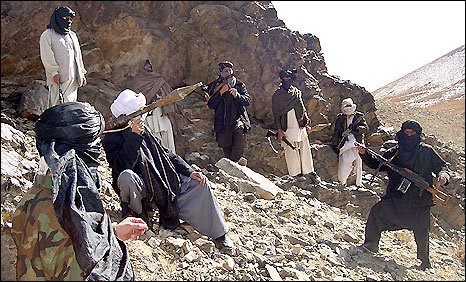No End In Sight: Taliban Takes Over Sangin District
Taliban fighters

NEW DELHI: Reports from southern Afghanistan suggest that the Sangin district in Helmand province is almost entirely under Taliban control.
After days of fierce fighting, police headquarters and the main government building in Sangin fell to the Taliban on Wednesday.
The Taliban issued a statement saying their fighters have seized the entire district, whereas Afghan officials maintain that fighting was ongoing and reinforcement were on their way. Taliban spokesperson Qari Yousuf Ahmadi, claimed on Wednesday: "The Sangin district centres, its police HQ, and other establishments were under continued attacks of the mujahideen and today... with God's grace the district was fully captured by the mujahideen. "The white flag of the Islamic emirate is at full mast at the district now.''
Afghanistan’s acting Defence Minister, Masoum Stanikzai, however described the situation in Helmand as “manageable” adding that fresh troops were on their way.
Reports from the ground seem to fall in line with the Taliban’s narrative. Ashuqullah, a police officer at the barracks, told the BBC the "entire" town was controlled by militants. "We have not seen any help," he said. "Support troops have been airdropped at a distance... but all roads are blocked and in the militants' control," he added.
Haji Daud, the head of the Sangin district people's council, told the BBC that Sangin residents had fled the district to neighbouring areas. Responding to the defence minister's claims, he said: "Those whose family - brothers and siblings and parents - are not fighting on the front, they always say the situation is not dangerous in the area..." "Those who make such comments do not care to defend Helmand," Daud told the BBC.
The Taliban’s gains in Sangin follow gains elsewhere in Afghanistan, including the fall of the city of Kunduz, Lashkar Gah, Gurian district and Warduj district.
The fall of Kunduz in fact prompted the US-led coalition to revise withdrawal plans, announcing instead that US troops will continue to remain in Afghanistan.
Meanwhile, Afghan President Ashraf Ghani tries to desperately reach out to the Afghan Taliban, with the latest reports indicating that a round of dialogue that had been called off may be back on the table. Whether this means little more than what it does on paper remains to be seen, as the Taliban has become increasingly factionalised after the death of leader Mullah Omar, with the faction led by Mullah Akhtar Mohammad Mansour being rejected by other factions within the group. The BBC, in fact, quoted a Taliban spokesperson saying that newly appointed leader Mullah Akhtar Mohammad Mansour had not been appointed "by all Taliban", going against Sharia law. A breakaway faction appointed another leader -- Mullah Mohammed Rasool -- and vowed to push on with their fight against the Afghan state.
In this scenario, the news that the talks are on may be premature. Mansour’s position on the talks remains unclear. In July, when Pakistan pressured the Taliban leadership to sit down for talks, Mansour disappeared, with his phones turned off. Even more importantly, although Mansour is the Taliban’s appointed leader, the extent of his command and mandate is a big question mark. Is Mansour going to be able to impose his will on the entire Taliban, especially as large numbers of militants have denounced his leadership? Unlikely.



